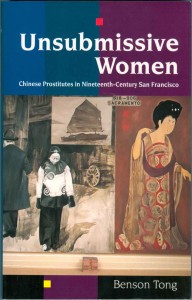 As Benson Tong attests in his book Unsubmissive Women: Chinese Prostitutes in Nineteenth-Century San Francisco (1994, ISBN 0-8061-3284-1), the Chinese prostitution dynamic in California has been thriving quite a while. As WoWasis reported in April, 2011, Asian Apartment Massage Parlors (AAMPs) proliferate today through the San Francisco Bay Area and the west coast of North America. Tong’s focus is the period of 1860-1880, and he describes the entire milieu, from the business aspect on the part of customer, woman, and holding company, to the societal and legal aspects of the trade.
As Benson Tong attests in his book Unsubmissive Women: Chinese Prostitutes in Nineteenth-Century San Francisco (1994, ISBN 0-8061-3284-1), the Chinese prostitution dynamic in California has been thriving quite a while. As WoWasis reported in April, 2011, Asian Apartment Massage Parlors (AAMPs) proliferate today through the San Francisco Bay Area and the west coast of North America. Tong’s focus is the period of 1860-1880, and he describes the entire milieu, from the business aspect on the part of customer, woman, and holding company, to the societal and legal aspects of the trade.
The average age of these women was 24-27. Although many were sold by their parents (an act agreed to by many women, eager to support their extended families), additional women came voluntarily. Some, as Tong pointed out, were taken against their wills, and many of them were successfully vetted by customs officials and returned home. The author describes the Tongs and Chinese Six companies, the wharfside public auctions of the women, and how the business of prostitution was run. Somewhat surprisingly, he reveals that being a former prostitute wasn’t necessarily a gating issue to Chinese men in search of wives.
The bête-noire of the prostitution business, as Tong points out, were middle class protestant Christian women, who often founded homes for “reformed” prostitutes. And as the title suggests, the author debunks the myth – still common in the United States today — of Asian women being subservient. His passages on the China Doll and Dragon Lady archetypes are compelling.
Many, if not most, of these women signed contracts of indentured servitude while in China, a situation contractually not unlike what’s happening now in the 21st century. Only the terms have changed. A contract from the earlier era reads:
Contract Between Ah Ho and Yee-Kwan
An agreement to assist the woman Ah Ho, because coming from China to San Francisco she became indebted to her mistress for passage. Ah Ho herself asks Mr. Yee-Kwan to advance for her $630, for which Ah Ho distinctly agrees to give her body to Mr. Yee for services as a prostitute for a term off four years.
There shall be no interest on the money. AhHo shall receive no wages. At the expiration of four years Ah Ho shall be her own master. Mr. Yee-Kwan shall not hinder or trouble her. If Ah Ho runs awav before her time is out her mistress shall find her and return her, whatever expense is incurred in finding and returning her Ah Ho shall pay. On this day of the agreement Ah Ho with her own hands has received from Mr. Yee-Kwan $630. If Ah Ho shall be sick at any time for more than ten days she shall make up by an extra month of service for any ten days’ sickness.
Now this agreement has proof. This paper received by Ah Ho is witness.
TUNG CHEE,
TWelfth year, ninth month, fourteen day.
Today, this contract is similar to those signed by those women who come to the U.S. under similar circumstances, in which they receive money for air fare. The term, however, is typically one year. But many —if not most — women engaged in this business recognize the value of payingtheir own air fare, and thus run their own business as free-lancers, working their own days and hours to their preference.
Tong’s book is a welcome respite, in the sense that it depicts women in the business who do have a tremendous amount of control over their own lives, vocations, and decisions, anathema to religious organizations bent on stopping the trade. Buy this book now at the WoWasis eStore.
Leave a Reply